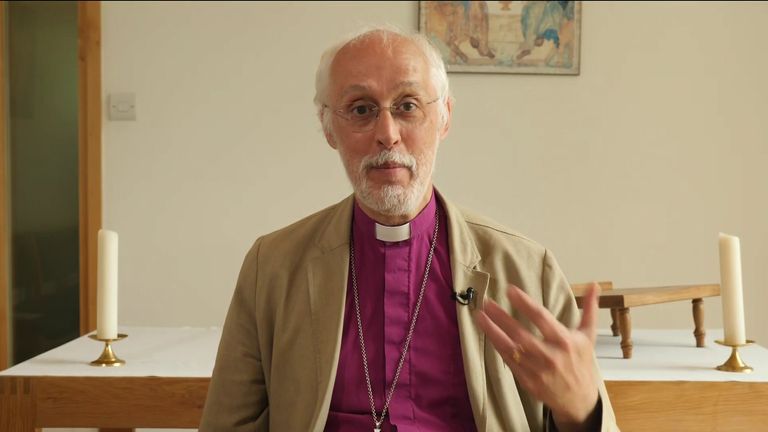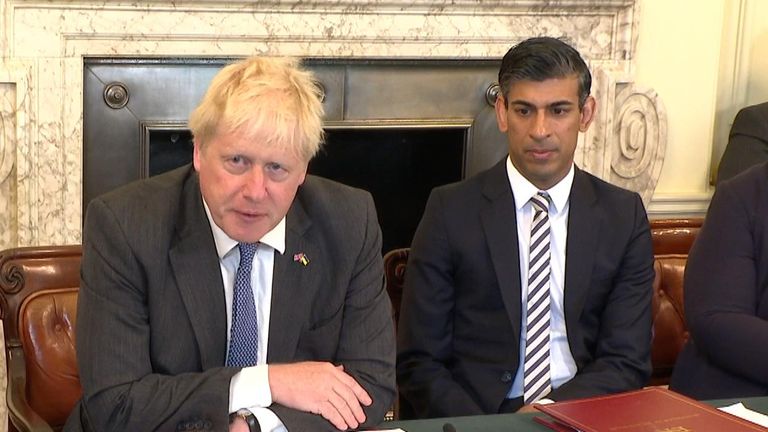[ad_1]
An asylum seeker has lost his legal bid to avoid being sent to Rwanda on a government deportation flight later today.
This morning it was understood that seven asylum seekers were due to be on the first flight from the UK to the east African country, due to take off this evening.
The man, an Iraqi Kurd, had suffered PTSD in Turkey while travelling to the UK, and had brought a claim asking not to be removed due to his mental health and his relationship with his sister, who lives in the UK.
His application was rejected by Mr Justice Swift, who said: “The Secretary of State was entitled to reach the decisions she did.”
It was the first of three appeals against removal orders to Rwanda being heard at the High Court today.
Truss challenges critics of Rwanda deportations to come up with an alternative – Politics news live
The flights are part of a government strategy to deter illegal immigration into the UK.
It has been described by critics as “unworkable and expensive”.
Liz Truss told Sky News this morning she could not say exactly how many migrants would be on board the plane which is due to take off this evening.
But she rejected claims from Church of England leaders that the policy to put asylum seekers on a one-way flight to east Africa “shames Britain”.
Two legal challenges to the first flight under the Rwanda scheme have now failed with reports putting the cost of the flight at £500,000.
So far, 92 adults and 12 children have been brought ashore by Border Force officials this morning after attempting to cross the Channel. Asked where they had come from, they said Syria, Iraq and Afghanistan.
Ms Truss told Sky News: “We are expecting to send the flight later today.
“I can’t say exactly how many people will be on the flight.
“But the really important thing is that we establish the principle and we start to break the business model of these appalling people traffickers who are trading in misery.
“There will be people on the flight and if they are not on this flight they will be on the next flight.”
Ms Truss said she could not put a figure on the cost of the flight but insisted: “It is value for money.”
She rejected criticism from the bishops, saying the Rwanda policy was “completely legal” and “completely moral” and challenged opponents to come up with an alternative to the scheme, which she claimed “is effective and does work”.
Meanwhile, Boris Johnson hit back at lawyers challenging the policy – which the government claims will deter migrants from paying people smugglers to take them on perilous Channel crossings rather than other routes.
He told the Cabinet on Tuesday: “What the criminal gangs are doing and what those who effectively are abetting the work of the criminal gangs are doing is undermining people’s confidence in the safe and legal system.”
‘Unworkable and expensive’
Labour’s shadow culture secretary Lucy Powell told Sky News: “We think this policy is unworkable… it’s incredibly expensive. It’s going to cost possibly over a million pounds per unsuccessful or successful refugee going to Rwanda. And we do think it’s unethical – and it’s quite un-British actually.
“We’ve been known around the world as a safe haven for those genuinely fleeing persecution and war – it’s been part of our make-up in this country for decades.”
The Archbishops of Canterbury and York – as well as 23 other bishops – have written a letter to The Times that claims no attempt has been made to “understand the predicament” of those affected.
After two legal challenges failed, a plane is scheduled to leave for the Rwandan capital of Kigali later, but it is unclear how many asylum seekers will be onboard.
Their letter says: “Whether or not the first deportation flight leaves Britain today for Rwanda, this policy should shame us as a nation.
“The shame is our own, because our Christian heritage should inspire us to treat asylum seekers with compassion, fairness and justice, as we have for centuries.”
More legal challenges today
Religious leaders have called for “evil trafficking” to be combatted by the provision of safe routes for refugees trying to reach the UK, adding: “Deportations and the potential forced return of asylum seekers to their home countries are not the way.”
It comes days after the Prince of Wales reportedly described the Conservatives’ policy as “appalling”, and after Imam Qari Asim, the senior imam at the Makkah Mosque in Leeds, said it “challenges our human conscience and compels us to speak up for human dignity”.
Read more:
What is it like to be a refugee in Rwanda?
Asylum seeker says he would rather die than be sent to Rwanda
Why are migrants being sent to Rwanda and how will it work?
The Archbishop of Wales and the Catholic Archbishop of Westminster have also criticised the policy – as have charities, human rights groups and the UN High Commission for Refugees.
Three further legal challenges are expected to be heard at the High Court on Tuesday. These are being brought by people who face being removed on the first flight.
‘We welcome court’s decision’
The government has said it is aiming to deter people from making dangerous Channel crossings from France in flimsy small boats run by smugglers.
A government spokesman said: “We welcome the court’s decision in our favour, and we will now continue to deliver on progressing our world-leading migration partnership which will help prevent loss of life and break the business model of vile people smugglers.
“Rwanda is a safe country and has previously been recognised for providing a safe haven for refugees – we will not be deterred in delivering our plans to fix the broken asylum system which will ultimately save lives.”
Last year, more than 28,000 people crossed the Channel in small boats – more than three times the number seen in 2020.
More than half were either Iranian or Iraqi, with people from Eritrea and Syria also making crossings, according to Home Office figures.
[ad_2]









